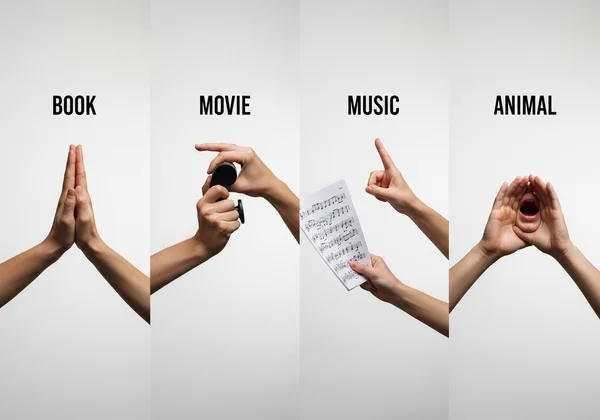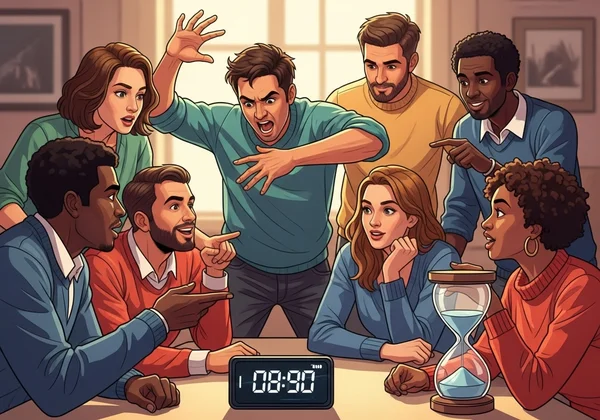The 4 Charades Categories: Master Your Guessing Game with Our Charades Generator
Ever been in a charades game where one player effortlessly acts out "The Lion King" while another struggles with the word "lamp"? The difference often comes down to one simple secret: understanding the core charades categories. What are the 4 categories of charades? Knowing them is the key that unlocks faster acting, smarter guessing, and a whole lot more fun for everyone involved.
This guide will break down the foundational categories that form the backbone of this classic party game. Whether you're a seasoned actor or a first-time guesser, mastering these concepts will transform your gameplay. Forget the awkward silences and frantic, confusing gestures. It's time to learn the system and find the perfect words with a charades word generator to take your game night to the next level!

Understanding the Core Charades Categories
At its heart, charades is a game of communication and deduction. The categories provide a framework that helps both the actor and the guessers get on the same page quickly. Instead of guessing from an infinite pool of words, the team can narrow their focus, leading to quicker solves and more exciting rounds.
Why Categorization Enhances Your Charades Game
Think of categories as the ultimate cheat sheet. When the actor signals a category at the start of their turn, they give their team a massive clue. Is it a person? A place? This initial piece of information prevents wild goose chases and helps guessers focus their energy on relevant ideas. For the actor, knowing the category helps structure their performance, allowing them to use established signals and shortcuts to convey the core concept before diving into specifics.
Standard Signals for Each Charades Type
Before a round begins, the actor typically uses hand signals to announce the category to their team. While house rules can vary, these are the most common signals used in charades:
- Person: Stand with hands on your hips, like a superhero pose.
- Place: Draw a circle in the air with both index fingers to represent the globe.
- Animal: Act like you're clawing the air with both hands.
- Thing/Object: Draw a square or rectangle in the air to represent an object.
- Title (Book, Movie, Song, Show): Make a motion of opening a book with your hands.
Establishing these signals before you start playing is one of the best charades tips for a smooth and fair game.

- Person: Hands on hips (superhero pose).
- Place: Two index fingers drawing a circle in the air (globe).
- Animal: Hands clawing the air.
- Thing/Object: Hands drawing a square/rectangle in the air.
- Title: Hands mimicking opening a book. The hands should be diverse, and the gestures clear and easily recognizable.
Decoding the Main Types of Charades
While the four main groups are Person, Place, Animal, and Thing, the "Thing" category is often expanded to include Titles (like movies, songs, and books). Let's dive into each one with tips for acting and guessing.
Person: Embodying Famous & Fictional Characters
This category is all about bringing an individual to life. It can include historical figures, celebrities, or beloved fictional characters. The key is to focus on a signature trait, action, or accessory associated with that person.
- Acting Tips: Don't just stand there! If your person is a singer (like Elvis Presley), pretend to hold a microphone and shake your hips. For a superhero (like Spider-Man), mimic shooting webs. For a historical figure (like Albert Einstein), stick your tongue out and act like a genius. Focusing on one iconic gesture is often more effective than trying to act out their entire life story.
- Guessing Tips: Once you know it's a person, start broad. Ask: "Male or female?" "Real or fictional?" "Alive or dead?" Then, narrow it down based on the actor's clues. "Are they a musician?" "An actor?" "A scientist?"
Place: Setting the Scene for Global & Local Locations
From the Eiffel Tower to your local library, the "Place" category covers any geographical location. These can be tricky, but the secret is to act out an activity or landmark associated with the location.
- Acting Tips: To act out "Paris," you might pretend to climb the Eiffel Tower or eat a baguette. For "the beach," you could mimic swimming and lying in the sun. If it's a country, you can try to gesture its shape on a map or act out a famous cultural tradition.
- Guessing Tips: Start with continents and countries, then drill down to cities or specific landmarks. Pay attention to the scale of the actor's gestures. Are they acting out something huge, like a mountain range, or something smaller, like a building? Need some inspiration? A random charades generator can provide endless location ideas.
Animal: Unleashing Your Inner Creature
This is often the most fun and hilarious category, especially when playing with kids. From a roaring lion to a slithering snake, animal charades are all about physical comedy and imitation. This is a perfect category to get ideas from a kids charades generator.
-
Acting Tips: Get on the floor if you need to! Waddle like a penguin, hop like a kangaroo, or gallop like a horse. The most important clues are the animal's movement and the sound it doesn't make (since you can't talk!). Use your whole body to sell the performance.
-
Guessing Tips: Think about where the animal might live. "Is it a farm animal?" "A jungle animal?" "Does it swim or fly?" These questions help eliminate entire groups of animals and guide your team to the right answer.
![]()
Thing/Title: From Objects to Abstract Ideas
This is the broadest and often most challenging category. It can be a simple object like a "chair" or a complex movie title like "Raiders of the Lost Ark." For titles, the actor first signals the number of words, then acts out each word individually.
- Acting Tips: For simple objects, act out how you would use them. For a "guitar," pretend to strum it. For a "phone," hold it to your ear. For titles, break them down. Act out "sounds like" by cupping your ear or use small words like "a," "an," or "the" by making a tiny gesture with your thumb and index finger.
- Guessing Tips: For titles, keep track of the number of words. Once one word is guessed, build on it. Don't be afraid to shout out synonyms or related concepts. Sometimes the actor is portraying an idea linked to the word, not the word itself.
Mastering Charades Rules for Seamless Gameplay
Knowing the categories is only half the battle. To ensure your game night is a hit, you need to have a clear understanding of the fundamental rules and strategies.
Essential Charades Rules for Smooth Gameplay
While you can always add your own spin, these are the universal rules that keep the game fair and fun:
- No Talking: The actor cannot make any sounds, including humming, whistling, or mouthing words.
- No Pointing: The actor cannot point at objects in the room to give clues.
- Teams: Split into two or more teams. One person from a team acts for their own team to guess.
- Time Limit: Each turn typically lasts for one to three minutes. Using a timer keeps the game moving.
- Winning: The team with the most correctly guessed words at the end wins!
Acting Strategies for Each Category
Beyond the basics, great actors use strategy. Before you start, think about the most defining feature of your word. For a "Person," is it their job or a famous pose? For a "Title," which word is the easiest to act out first? Starting with a strong, clear clue can give your team the momentum they need. Don't be afraid to switch tactics if your first approach isn't working.
Guessing Strategies: Spotting the Clues & Winning
Guessing is an active sport! Don't just sit back and watch. Shout out ideas as soon as they pop into your head. Even wrong guesses can spark the right idea in a teammate. Pay close attention to the actor's signals for category and number of words. And remember to listen to your teammates' guesses—building on their ideas is a key part of how to win charades.

Elevate Your Game: Start Playing Smarter Charades Now!
Understanding the four core charades categories transforms the game from simple pantomime into a strategic challenge. It empowers actors to give clearer clues and helps guessers make intelligent deductions. By learning the signals and strategies for Person, Place, Animal, and Thing/Title, you're ready to lead your team to victory and create hilarious, memorable moments.
Ready to put your new knowledge to the test? Stop wasting time trying to think of words and start playing instantly. Head over to the Charades Generator to get endless, categorized ideas for your next game night!
Frequently Asked Questions About Charades Categories
What are the 4 categories of charades?
The four classic and most fundamental categories of charades are Person, Place, Animal, and Thing. The "Thing" category is often expanded to include titles of movies, books, songs, and TV shows, making it one of the most versatile groups.
How do you make charades more fun and engaging?
To make charades more fun, use a wide variety of words and phrases that challenge players. Using a tool like a funny charades generator ensures fresh and hilarious ideas. You can also introduce themed rounds (like 80s movies or Disney characters) or create special rules, like acting with only one hand.
Can I use a charades generator to get ideas for specific categories?
Absolutely! The best part about using an online tool is the ability to customize your game. A quality charades ideas generator allows you to select specific categories like Actors, Movies, or Songs, and even choose a difficulty level. This ensures the words are perfectly suited for your group, whether you're playing with adults or kids.
What are some good charade questions for beginners?
For beginners, it's best to start with simple, concrete nouns and actions. Think of common animals (cat, dog, fish), everyday objects (book, phone, car), and simple actions (eating, sleeping, running). These words are easy to act out and guess, helping new players build confidence before tackling more complex ideas. You can generate your words by setting the difficulty to "Easy."